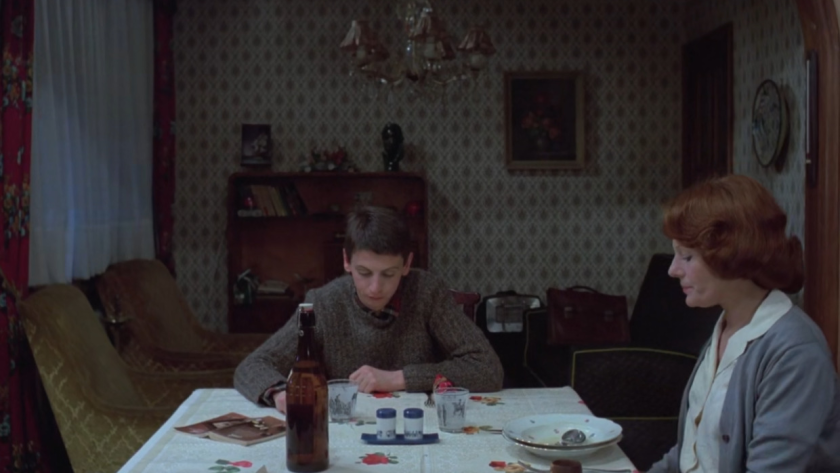Sothysen Tuyor reconsiders Chantal Akerman’s Jeanne Dielman, 23 quai du Commerce, 1080 Bruxelles (1975) fifty years after its release and three years after being voted ‘the greatest film of all time.’
After walking out of the press screening of this film, I could not help but sit blankly at the café adjacent to BFI Stephen Street. I had seen this film before in 2022, in shock of its victory to the number one spot in the Sight and Sound critics’ poll. While I remain doubtful about its success, I nonetheless am fine with it upon this rewatch, despite the film’s runtime of over three hours. Yet, there are no words to describe the experience. It is already an uphill battle explaining it to friends, but what about general audiences? I deemed that such a film is not only impossible to explain, but needs no explanation. It simply needs to be lived through in its runtime. After all, the full title being an address is more than enough to cause intrigue and suggest such a perspective.
Most importantly, Jeanne Dielman is a boring film. I do not mean that with any negative connotations. Slow cinema can be criticised as such, but the suspension of patience and plot for immersion is what makes it so often compelling. On the first watch, most viewers, including me, cannot intuitively anticipate any set rhythm or direction to the film the same way a genre piece like a Western would. No expectation is really established from the start. The vector, if it exists, which moves the film forward is character driven, as opposed to scenario driven. We are only left to the life of the titular widow and mother (Delphine Seyrig) whose routines, chores and errands, including regularly consorting with men before her son returns from school, lack any glaringly observable pleasure. And it is through this drudgery of housework, the duties of not only a mother but also a woman under a quite clearly patriarchal and capitalist society, that we gain a view into a different type of oppression, one that is unceasing but invisible to so many of us.
The BFI’s screening of this film comes as a timely arrival for both the wider world and cinema. Its deeper reflection of wider debates on gender and humanity under our own societies and structures is evident. I would argue that not much has changed since 2022, or 1975 for that matter. The drudgery of housework continues to be a required burden on the unsung heroes barely recognised by ourselves as we go about our daily lives with clean clothes and return home to a meal and bed. And that is one of the various points I feel Akerman encapsulates in the film. There is notably no well-defined “evil” in the film, only freedom and unfreedom. Characters, including Dielman’s son Sylvain (Jan Decorte), do not act in any way that is particularly heroic or villainous; they are but individual actors taking life as it is and resigned as gears to this sputtering machine. This question of freedom is, of course, left for audiences to ponder on the screen as Dielman peels potatoes for a good while or breads veal with a near-robotic demeanor. Yet, it is hard to argue otherwise when we see this skill that almost seems built up through necessity rather than desire. I would dare anyone watching to detect any clear moment of unconstrained pure human joy on her face throughout. That is not what I suggest as a larger point of the flm but rather an avenue to refect on Akerman’s holding up of a mirror to Franco-Belgian or even just Western and European culture of the later 20th century.
There is inevitably a debate about the necessity of the runtime and whether one should be subject to housework for so long just to get a point about a woman’s life who they could probably care less about. I am in partial agreement. An intermission would have been helpful for my legs and back but, nonetheless, I think that this final result is more compelling. Dielman is given practically no break from her routine; she is only really in control of how she carries it out and the significance of that control can be questioned as well. In giving an intermission the audience would have had the rest and unwind she never got. It is all the more powerful as a reflection of the endless drudgery if the audience is even further immersed in the film in this manner.
The BFI’s screening of the film is also convenient in light of their planned commemorative retrospective of Akerman’s work this year (the film’s 50th anniversary and what would have been Akerman’s 75th birthday). Heading into the awards seasons, mostly shocked and disappointed at the nominations of Emilia Pérez (2024), celebrating the continued trend of long runtimes in films like The Brutalist (2024) and Dune: Part Two (2024) and at least open to boundary breakers like Nickel Boys (2024), there is a good opportunity to reflect on what we feel cinema can be. Oftentimes when one sits in their theatre seat, they are expecting to briefly escape from their own lives. It is the notable empathy machine that makes us live as ourselves and more in the course of the runtime, where we may be at our most emotional and introspective. So when Akerman perhaps realises the risks of pure escapism through the silver screen, she redirects the audience towards a topic we know intuitively but practically do not witness. It is social commentary at its most explicit as Jeanne Dielman works to serve everyone but herself up until it, perhaps, becomes too much.
“Don’t read while you eat” is a line that Jeanne Dielman says to her son every night at the dinner table. To one end it is but an expectable order from a parent to not be so distracted, almost a line of filler. But I think it contributes to something deeper, a request to genuinely appreciate the love in her endless and tiring service. Yet Sylvain sits with her, shrouded in her same disposition of ennui, locked only in other thoughts as they go about the rest of their dinner. Sylvain does not see the woods for the trees.
This film serves as an undeniably modern and strong work of cinematic realism and I highly advise audiences to view it despite the runtime and continuous mind-numbing chores. For if these were the defining issues, then there is a risk of also missing the woods for the trees, or perhaps the dinner and motherly service for the book.
Jeanne Dielman, 23 quai du Commerce, 1080 Bruxelles (1975) is screening at the BFI Southbank and is also available on BFI Player. Other films and works by or relating to Chantal Akerman to be screened by BFI will be shown in February and March (checking the programme is advised).




